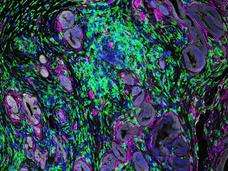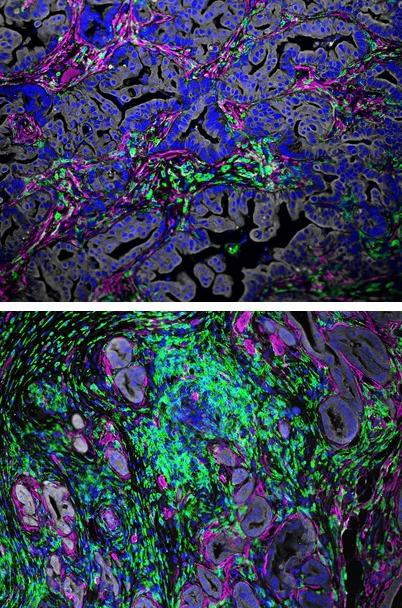, by Elia Ben-Ari
Pancreatic cancer is an aggressive disease that is notoriously resistant to treatment. Many cancer types and most pancreatic cancers are driven by mutations in a gene called KRAS, so researchers have long sought drugs that block the actions of mutant KRAS proteins made from these altered genes.
But, until recently, efforts to develop drugs that block the cancer-fueling effects of mutant KRAS proteins have been unsuccessful.
Now, results from a new study in mice have identified a promising experimental drug that directly targets pancreatic tumors with a particular KRAS mutation known as G12D. The G12D mutation is the most common in pancreatic cancer, present in approximately 35% of people diagnosed with the disease.
The new drug, known as MRTX1133, shrank tumors or halted their growth in several mouse models of human pancreatic cancer with KRAS G12D mutations, including a genetically engineered mouse model known as KPC that closely mimics the human disease. Findings from the NCI-funded study were published December 5 in Cancer Discovery.
MRTX1133 is the first KRAS-blocking drug, and the first targeted therapy of any kind, to have such promising results in these mouse models of pancreatic cancer, said Ji Luo, Ph.D., of NCI’s Center for Cancer Research, who was not involved with the new study.
The findings in the KPC mice, which are “considered the most rigorous mouse model of pancreatic cancer,” Dr. Luo said, “make me cautiously optimistic” that the drug could shrink tumors in patients with KRAS G12D-mutated pancreatic cancer.
“The KPC mouse model of pancreatic cancer is highly resistant to every drug that has been tested, very much like the human disease,” said Ben Stanger, M.D., Ph.D., of the University of Pennsylvania Abramson Cancer Center, who co-led the new study.
With MRTX1133 treatment, Dr. Stanger said, “we saw shrinking of tumors greater than we have ever seen in our 10 years of testing multiple compounds” against pancreatic cancer in these mice.
Treatment helps immune cells penetrate pancreatic tumors
The KRAS protein normally acts like an on–off switch. In response to certain signals, it becomes activated and tells the cell to grow and divide. When the signals are no longer present, it turns off. However, some mutant forms of KRAS, such as KRAS G12D, remain active even in the absence of growth signals, leading to uncontrolled cell growth.
The KRAS G12D mutation is present in more than one in three pancreatic cancers, about one in ten colorectal cancers, and in several other cancer types.
Although developing compounds that bind effectively to KRAS G12D has proven challenging, researchers at Mirati Therapeutics, the company that developed MRTX1133, showed in a recent study that the drug specifically blocks the actions of the G12D mutant form of the KRAS protein. In that same study, the drug shrank tumors in mouse models created by transplanting human pancreatic cancer cells into mice with weakened immune systems.
Importantly, Dr. Luo said, the pancreatic cancer models used in the new study had intact immune systems, as most people do. These models included mice with tumors created by implanting lab-grown mouse pancreatic tumor cells under the skin or into the pancreas, as well as the KPC mice.
KPC mice are genetically engineered so that tumors develop from normal pancreas cells that become cancerous, “the way a tumor would naturally develop [in humans], as opposed to taking preexisting cancer cells and injecting them into a mouse,” Dr. Stanger explained.
In all these models, his team showed, MRTX1133 not only inhibited the growth of KRAS G12D-mutant pancreatic tumors but also, through indirect effects that are not fully understood, caused changes in the environment surrounding the cancer cells.
One of the things that makes pancreatic cancers so hard to treat, Dr. Stanger explained, is that the tumor cells create a dense web of proteins and noncancerous cells around them. This web, which is part of what is called the tumor microenvironment, helps the tumor cells grow and impairs the immune system’s ability to attack them.
When a treatment is highly effective in killing tumor cells, “you usually trigger some sort of remodeling of the tumor microenvironment as well as changes in the immune cells that are part of the microenvironment,” Dr. Luo said.
Indeed, Dr. Stanger’s team found that blocking KRAS G12D activity with MRTX1133 resulted in several changes in the tumor microenvironment. Most notably, he said, treatment with MRTX1133 “allowed cancer-fighting immune cells called T cells to come into the tumors.” This finding is encouraging, he explained, “because it means that the T cells can now begin to recognize the cancer cells.”
In addition, when the team eliminated T cells from the mice, they found that tumors did not shrink as much in response to the experimental drug and grew back faster after treatment was stopped.
Testing MRTX1133 with checkpoint inhibitors
These findings, Dr. Luo said, suggest that MRTX1133 helps enlist the immune system to attack tumors, enhancing the drug’s effects. That might mean that combining the drug with immune checkpoint inhibitors—which help T cells kill cancer cells—could make it more effective, he said.
And “that is exciting because checkpoint inhibitors generally don’t work well [by themselves] in pancreatic cancer,” Dr. Luo said. If MRTX1133 enables cancer-fighting T cells and other immune cells to move into the tumor, he said, “that creates an opportunity for a checkpoint inhibitor to come in and work better.”
In fact, Dr. Stanger said that he and his colleagues next plan to test combinations of MRTX1133 and immunotherapy drugs in their mouse models.
Studies in mice have shown promising results for a similar combination approach using drugs that block a different mutant form of KRAS, known as G12C. And clinical trials of combination therapy with KRAS G12C inhibitors and immune checkpoint inhibitors are already under way in patients with non-small cell lung cancer, Dr. Luo said.
Another potential advantage of combining KRAS inhibitors and checkpoint inhibitors is that these drugs “work through completely different mechanisms,” Dr. Luo said. “So, you are less likely to get resistance in the tumor that could evade both treatment strategies simultaneously.”
However, both he and Dr. Stanger emphasized, the next critical step for MRTX1133 will be testing it by itself in people with pancreatic cancer to make sure it’s safe.
“We’re optimistic that this and other drugs that target KRAS being developed by various companies will make their way into clinical trials in 2023,” Dr. Stanger said.








